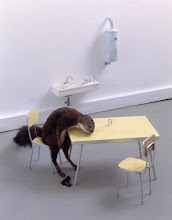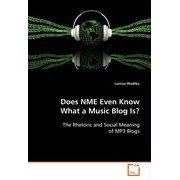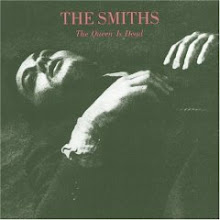
One particularly irritating stereotype is the one that implies females cannot be involved in music the same way males can, whether it be as an artist or a critic or a fan. Sure, females can be artists, but they'll always run up against some sort of crazy catch-22 where if they're too masculine, they're betraying their femininity, but if they're too feminine, they're just playing into female stereotypes. Just read Simon Reynolds and Joy Press's book The Sex Revolts to experience this frustration (I disagreed with several points in the book's argument, especially the chapter that dealt with The Clash and the Manic Street Preachers, which argued that both bands were so homosocial and "gang-like" that they deliberately excluded women from their worlds - anyone who actually knows anything about both bands couldn't possibly criticize them for this borderline misogynist attitude). Additionally, sure, there have been female music journalists/critics, just not nearly as many as male ones, nor as many famous ones - I know that I haven't ever been aware of being a fan of a female music journalist or critic. And as far as music fans go, most music magazines are clearly aimed at a male market as males are assumed to be the most fanatical and obsessive when it comes to loving music. Females are often portrayed as being less critical in their music choices and as lovers of popular music rather than alternative styles, that they are more suited for fawning, groupie-like behaviour than that of intelligent connoisseurs. It's all ludicrous from my point of view, but then again, just by scanning through the MP3 blogs out there and The Hype Machine demographics, I would have to admit that the vast majority are written and consumed by males.
In the research I've done on blogs and general blogging behaviour, it seems more females blog than males, but that they are more likely to favour the diary style as opposed to the filter style, which is arguably more objective and usually about topics and issues outside of the blogger's personal life (ie: politics, technology, etc.). When doing my own primary research about MP3 blogs, I noticed a plethora of styles that couldn't be concretely linked to the bloggers' genders. In many cases, bloggers, including myself, use pseudonyms that don't readily reveal the bloggers' genders. To be honest, I hadn't really thought too much about whose blogs I was reading in relation to their gender identity - selection of music and writing style most often draw me to particular MP3 blogs more than anything else, which I assume is the case for most other MP3 blog readers. At least I hope so.
Interestingly enough, I received a comment awhile back on a post I wrote about not wanting to grow up; it stated that the feelings I was expressing were a "boy thing." I've also been called a "dude" or "guy" in other places by other bloggers and once or twice in comments on my YouTube videos. I find this rather fascinating from a rhetorical standpoint - it means that something in my style or rhetorical presence connotes masculinity. At this point, I don't quite know what it is since I analyze enough rhetoric without bothering with my own (I'd rather not be too conscious of the how in case it affects and influences my future writing). Admittedly, ever since I was younger I read books mostly by male authors, but did that really shape me and my future writing style, or was there something in my nature that drew me to them first? And why can I only share my musical fanaticism with males (most of the females I know get glassy eyes after I ramble on too long about music)? Is any of this related to each other? I hadn't until recently realized how out of place I seemed in my attitude towards music (and several other things, mind), but gender performance and societal expectations seem to explain this issue.
Though the song, The Girl Who Wanted to Be God, was definitely not one of the Manic Street Preachers' finest moments, it still holds some of Richey Edwards' most cryptic lyrics as far as I'm concerned (okay, Revol is also a bit of a mystery). Having a history of writing songs that either criticized or bemoaned masculinity, Richey, and to a somewhat lesser extent Nicky Wire, seemingly wrote from a position of gender identity crisis. However, this song's meaning, no matter how much I use my university-educated guesswork about metaphor and imagery, still eludes me.
There are no sunsets just silence
You could see that she was true and faithless
But see through the future and forget all the lies
Black out the words for the blind have eyes
I am the girl who wanted to be God
There are times when you feel hopeless
Just for once for no-one else we are blameless
The dawn is still breaking its heaven is so high
She told the truth, told the truth and then she lied
Hold me she said love me to death
These lyrics switch between third and first person positions, seemingly making its narrator both objective and subjective. Is the girl the narrator? Is the girl actually a male narrator? How much of Richey can be read into these words? Like with most literature, no one will ever concretely know the answer; everything is speculation. While Richey often appeared to identify himself with females, whether through songs about prostitution or anorexia, it all seems to amount to his feeling trapped into gender performance expectations, and perhaps that's part of what made me identify with and love the Manics so much. As well-known as the Manics are for their comments and lyrics on politics, they are just as prolific in gender politics. Though the Manics did glam it up (and the Wire still does to an extent) in their beginning, emphasizing the artificiality of gender roles just as glam and camp acts always have, I think they had some of that more internal androgyny that Morrissey was so adept at expressing. My thinking is that androgyny of this sort would be a lot more helpful in creating a whole human than favouring one side of the gender spectrum in some global game of make-believe.
What came first, the gender stereotype or the behaviour? I suppose that's more of a question of nature versus nurture, which, with only an introductory course in Psychology under my belt, is an issue I'm not prepared to debate right now. In my perfect world, none of this would matter at all anyway. Gender is just one of the many ways of identifying who one is. I would much rather classify people by the music they love than whether they are female or male, girlie or boyish. In the words of Depeche Mode, people are people. And music is bigger than that.
Gender Bombs - The Stills
The Girl Who Wanted to Be God - Manic Street Preachers





















































5 comments:
Hello there,
I kind of stumbled onto your blog randomly today (I googled Mechanical Owl), but I was really happy to find this entry because it's been something I've been thinking about myself lately. Especially about women in terms of being artists, since I am female (not that I exactly feel like one) and am pursuing art.
The one thing you didn't really seem to touch on in your entry is sexuality. I did a project on Gertrude Stein earlier this year, and found that she was a fan of some Austrian philosopher... I forget his name... but in any case, he said that women could not truly be geniuses unless they were lesbians (similarly, men that were too feminine could not geniuses). It's not something I've given proper thought to, so I can't make any bold and opinionated statements, but it's food for thought anyway.
wonderful, wonderful post! you're brilliant! incidentally, i also assumed you were male, i don't know why! maybe just because it's the default gender assumption? either way, keep up the fascinating posts, i really enjoy reading your blog! :)
I agree, great post. I often lurk on your blog. And while TGWWTBG is not their finest moment, a great song nonetheless.
I always thought it was about Sylvia Plath for some reason.
Thank you to all of you who commented. It's nice to know I've got an audience out there.
@ebony-creme
You're right - I didn't mention sexuality. I didn't primarily because I figured it could take up its own entire discussion. I figure sexuality is just as fluid as gender and can't be constrained into strict binaries. I would suggest reading Eve Kosofsky Sedgwick's Epistemology of the Closet for further discussion on the impossibilities of sexuality binaries. As for whether a person can only be a genius unless they are attracted to the same sex, or whether men that are too feminine can't be geniuses, I would say there's far too much evidence against both arguments and they are too rooted in a closed binary system. Whom people have sex with, whether with men, women, cars or themselves, or all of the above, only makes humanity more diverse and perhaps creates the conflict and difference that can inspire both great art and big thoughts.
@zico
Now that you mention it, I think I also read somewhere that TGWWTBG was about Sylvia Plath; however, the flip between first- and third-person still intrigues me, and I suppose I could speculate forever on what Richey was actually saying about Plath and/or himself.
Blu Ray Converter
Convert Blu Ray Mac
Convert Blu Ray to AVI
Convert Blu Ray to DivX
Convert Blu Ray to MKV
Convert Blu Ray to MOV
Convert Blu Ray to MP4
Convert Blu Ray to MPEG
Convert Blu Ray to MPEG2
Convert Blu Ray to MPEG4
Convert Blu Ray to VOB
Convert Blu Ray to WMV
Convert Blu Ray to Xvid
Convert Blu Ray to HD
Convert Blu Ray to HD WMV
Convert Blu Ray to iPod
Convert Blu Ray to PS3
Convert Blu Ray to PSP
Convert Blu Ray to Xbox360
Post a Comment